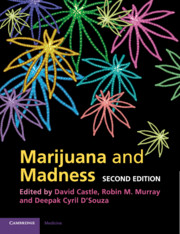Book contents
- Marijuana and Madness
- Marijuana and Madness
- Copyright page
- Contents
- Contributors
- Preface
- 1 How cannabis works in the brain
- 2 Other cannabinoids
- 3 The function of the endocannabinoid system
- 4 Is cannabis becoming more potent?
- 5 What are the policy implications of the evidence on cannabis and psychosis?
- 6 Cannabis, endocannabinoids and neurodevelopment
- 7 The impact of pubertal exposure to cannabis on the brain: a focus on animal studies
- 8 Cannabis and cognition: short- and long-term effects
- 9 Does cannabis cause lasting brain damage?
- 10 The association between cannabis use and depression: a review of the evidence
- 11 Cannabis, cannabinoids and bipolar disorder
- 12 Which cannabis users develop psychosis?
- 13 Cannabinoids and the cerebellum: a potential role in the development of psychosis
- 14 The neural basis for the acute effects of cannabis on learning and psychosis
- 15 Does cannabis use cause schizophrenia? The epidemiological evidence
- 16 Postmortem studies of the brain cannabinoid system in schizophrenia
- 17 The endocannabinoid system in schizophrenia
- 18 The acute effects of cannabinoids in patients with psychotic illness
- 19 Cannabis abuse and the course of schizophrenia
- 20 Understanding cannabis use in schizophrenia
- 21 Addressing cannabis use in people with psychosis
- Index
9 - Does cannabis cause lasting brain damage?
Published online by Cambridge University Press: 05 November 2011
- Marijuana and Madness
- Marijuana and Madness
- Copyright page
- Contents
- Contributors
- Preface
- 1 How cannabis works in the brain
- 2 Other cannabinoids
- 3 The function of the endocannabinoid system
- 4 Is cannabis becoming more potent?
- 5 What are the policy implications of the evidence on cannabis and psychosis?
- 6 Cannabis, endocannabinoids and neurodevelopment
- 7 The impact of pubertal exposure to cannabis on the brain: a focus on animal studies
- 8 Cannabis and cognition: short- and long-term effects
- 9 Does cannabis cause lasting brain damage?
- 10 The association between cannabis use and depression: a review of the evidence
- 11 Cannabis, cannabinoids and bipolar disorder
- 12 Which cannabis users develop psychosis?
- 13 Cannabinoids and the cerebellum: a potential role in the development of psychosis
- 14 The neural basis for the acute effects of cannabis on learning and psychosis
- 15 Does cannabis use cause schizophrenia? The epidemiological evidence
- 16 Postmortem studies of the brain cannabinoid system in schizophrenia
- 17 The endocannabinoid system in schizophrenia
- 18 The acute effects of cannabinoids in patients with psychotic illness
- 19 Cannabis abuse and the course of schizophrenia
- 20 Understanding cannabis use in schizophrenia
- 21 Addressing cannabis use in people with psychosis
- Index
Summary
- Type
- Chapter
- Information
- Marijuana and Madness , pp. 103 - 113Publisher: Cambridge University PressPrint publication year: 2011
- 1
- Cited by



